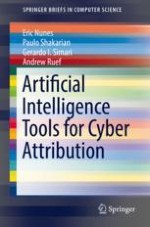2018 | OriginalPaper | Buchkapitel
4. Belief Revision in DeLP3E
verfasst von : Eric Nunes, Paulo Shakarian, Gerardo I. Simari, Andrew Ruef
Erschienen in: Artificial Intelligence Tools for Cyber Attribution
Aktivieren Sie unsere intelligente Suche, um passende Fachinhalte oder Patente zu finden.
Wählen Sie Textabschnitte aus um mit Künstlicher Intelligenz passenden Patente zu finden. powered by
Markieren Sie Textabschnitte, um KI-gestützt weitere passende Inhalte zu finden. powered by
